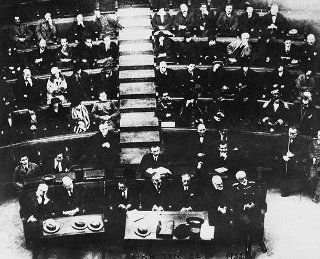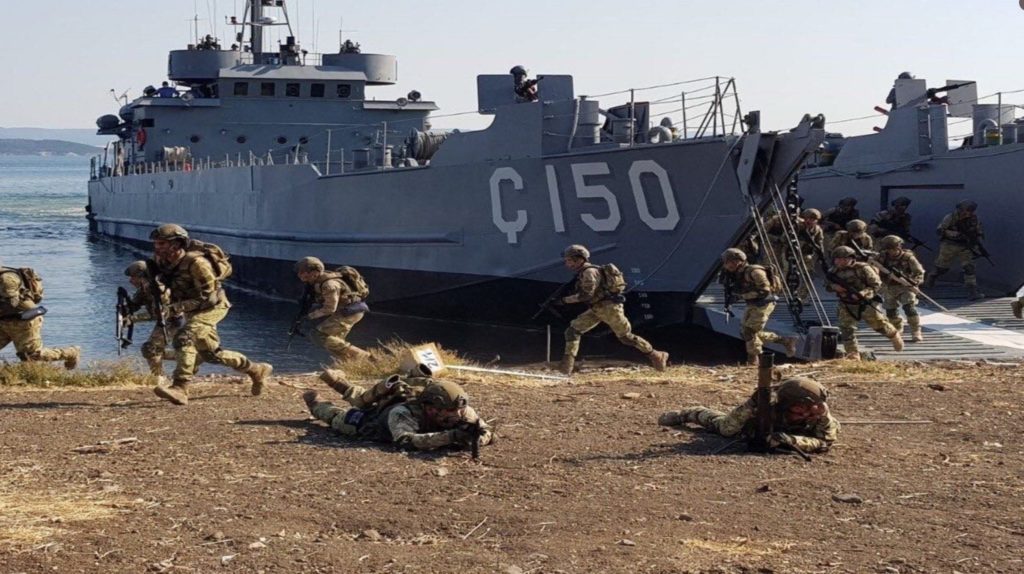Levent Kenez /Stockholm
Turkish defense minister and former chief of general staff Hulusi Akar has claimed that the islands that were given to Greece in the 1923 Lausanne Treaty and the 1947 Paris Peace Treaties on the condition that it not arm them are now militarized and that as a result their status is questionable.
Speaking at a press conference organized by the Anatolian Publishers Association (Anadolu Yayıncılar Derneği) last week, Akar also warned Greek officials by bringing to mind the execution of Greek politicians and generals in Athens who were held responsible for a defeat by Turkish forces in 1922.
Stating that despite the international agreements Greece had militarized 16 of the 23 islands, Akar claimed that Turkey has every right to self-defense against that threat. Greek sovereignty over these militarized islands and the validity of the agreements will also become controversial, the minister said.

Akar also reiterated that it is unacceptable to Turkey that Greece claims to have 10 miles of airspace over its islands in the Aegean despite their coastal shelf extending for only six miles.
Akar said Greek leaders woke up in the morning wondering what kind of a statement to make against Turkey today and urged them to learn from history.
“Some politicians in Greece are continuing their provocative actions and rhetoric in line with their personal ambitions because such discourse against Turkey supposedly brings something to them in domestic politics,” Akar told the journalists.
Akar also referred to a bloody trial that took place in Athens after Greek forces, which in 1922 had occupied western Anatolia in accordance with the 1920 Treaty of Sèvres, were defeated by the Turkish army and militia and had to withdraw from Anatolia.

In what is known as the Trial of the Six (or Execution of the Six, Δίκη των Έξι in Greek), former prime ministers Dimitrios Gounaris, Nikolaos Stratos and Petros Protopapadakis, former foreign minister Georgios Baltatzis, former war minister Nikolaos Theotokis and the last commander-in-chief of the Asia Minor campaign Gen. Georgios Hatzianestis were held responsible for the defeat by the Turks and were executed for treason on November 28, 1922 by an extraordinary military tribunal amid political unrest in Athens.
“Our Greek interlocutors should never forget how bitter the price of the despicable adventure undertaken a century ago was and that its six rulers were sentenced to death. One should learn from history and not pursue new adventures that will result in disappointment,” Akar added.
Claiming that Greece supports terrorist organizations against Turkey, Akar stated that all kinds of opportunities were provided to terrorists in the Lavrion refugee camp, which Turkey has repeatedly claimed has turned into a base for the outlawed Kurdistan Workers’ Party (PKK).
Problems of the Turkish minority in Greece are continuing, Akar said. Calling them Greek Muslims rather than Muslim Turks is a denial of their ethnic identity, according to Akar.
He also criticized the administration of the mosque in Athens, which he claimed Greece opened just for show, by Orthodox Christians.

Akar also expressed discomfort with a news story published by Nordic Monitor, which reported in April that an exercise named after Mavi Vatan (Blue Homeland), an aggressive naval doctrine identified with Turkey’s policy in the Mediterranean, included a scenario in which Turkish commandos captured an island and planted a Turkish flag. Akar stated that the images of the military drill were dated and gave the impression that Turkey was soon going to invade the Greek islands, which he said was not true.
Nordic Monitor previously reported that the Turkish military listed 131 islands, islets, and rock formations in the Aegean Sea whose status was disputed with neighboring Greece and prepared plans to take them over during a conflict, according to a confidential document.
Some also claim that Greece will invade the west of Turkey through the islands. Retired Adm. Cihat Yaycı, who helped President Recep Tayyip Erdoğan purge most pro-NATO officers from the military following a controversial coup attempt in 2016, claimed Turkey would be invaded by Greek soldiers stationed on the islands if the coup was successful. Many military experts found Yaycı’s claim funny and fantastical, stating that the Greek military presence on the islands could not pose a serious threat to Turkey.












